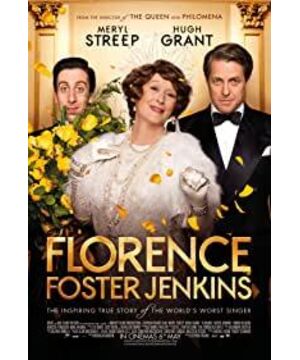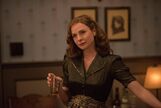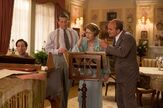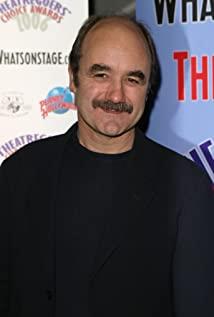On the basis of not understanding the character archetypes, the first half of the movie is indeed a little confusing. After the layers are cleared, the understanding can be improved. A sick woman with financial strength who loves music sings from a niche theater to a concert hall, accompanied by her husband and a pianist.
The whole drama more or less gave me some shadows of "The Emperor's Wedding Dress". While watching, I struggled to say what is the deep level, what I don't understand should I convey? Do you mean to say that the world is greedy for money, that the heroine's husband is selfish, etc. to expose critical things?
At the moment of the heroine's dying line in the whole play: "They can say that I can't sing, but they can't say that I haven't sung", all my senses tell me: everything doesn't matter anymore.
Think about it from the perspective of a little woman, I think this diva is enviable. I can pursue my own preferences all my life, and simply taking my liking as the standard is enough to make me, the poor people who work hard in this city and make a living, envy, envy, and hate. What's more, there is a lover who is willing to "deceive" your life?
I don't really understand the heroine's husband. Whether it's the look of the male protagonist talking to the doctor, or the female protagonist saying that he had a hard time when he went to play, the dinner party with singing and dancing, etc., all imply that the male protagonist is not "loyal" to marriage. Maybe this is the representative of a class of people who are separated from love and sex. I appreciate the female lead's attitude towards the male lead going to play regularly. She said, I know he needs to exercise. I don't know if it's more tolerant when I get older, or if the person with guilt will be tolerant in the relationship between the sexes (the female lead can't bear offspring for the male lead). In short, no matter whether the male protagonist stays with her selfishly out of coveting the female protagonist's property, I feel that "cheating" for a lifetime is true love.
Simon taught me what it means to be an actor relative to the Big Bang Theory. After the successful interview, the expression of desperately suppressing emotions reminded me whether I was so funny when I wanted to suppress my emotions and pretend to be generous. The character's transformation from being amazed at the diva's singing to being on the same stage and accepting it is not unexpected. On the contrary, it was the first time that the girl character who went to the niche theater to listen to a song and laughed and fell down was amazed.
The impression of rude behavior when lining up to buy tickets for the first time; the coquettishness of showing off her female sexual attraction to the soldiers when the concert hall entered the hall, contrasted with her maintenance when the audience cheered. Maybe the light of goodness is enough to overshadow the tacky character of this character. Rather, it's kind of genuine. After all, this character has no direct interest in the heroine. Her liking or acceptance is more real in my opinion.
Take a closer look, if I can be like the heroine, I am devoted to something or someone's life, at its beginning, at its end, and living in the present without tomorrow, how cool it is!
View more about Florence Foster Jenkins reviews











